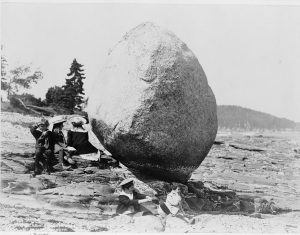As I gear up for another AHA annual meeting, I have been reflecting a lot about my own transition from graduate student to assistant professor. Mostly it’s because this will be my second year staffing the “Ask an Assistant Professor” booth at the annual meeting’s Career Fair. For those who can’t make it to the booth, and are mystified by life on the other side, here are some things about becoming an assistant professor that I wish I’d known as a graduate student. Knowing these then would certainly have made my move into a new stage of my career a lot easier and more enjoyable.

Ask for help when you’re feeling lost! One place is at the “Ask an Assistant Professor” booth at the Career Fair at AHA17. Credit: Marc Monaghan.
It is okay to be lost. Short of the exceedingly rare job candidate hired by her or his own graduate school, getting any job means transitioning to a new university with its own culture and ways of doing things. If my experience is any indicator, this transition is going to be harder than you think. Part of the reason in my case was hubris. You’re a bigshot professor now and should just know how these things work, right? Wrong. It is going to take time to adjust and it is going to be intimidating. You will be in meetings with colleagues with 30 or more years of experience at your institution who will sling confusing acronyms at a dizzying pace. There will be paperwork for everything you want to do and an unclear chain of command to resolve issues with students, scheduling, funding, compensation, and pretty much anything else you need or want.
In short, you’re going to be totally lost and a lot of things are going to go wrong. And you know what? That’s okay. Nobody expects you to know everything and it is okay to ask for help. Get to know your senior colleagues and ask them for guidance. Many departments assign junior faculty mentors and if yours does not, seek one out—it can make all the difference. Department administrators are also a godsend when it comes to dealing with the everyday complications of being an academic. They often have connections in the university and can help pull strings. You just have to remember that adjusting and learning how a new institution works takes time.
Balancing your job responsibilities can be hard. At the end of the day, a professor’s job responsibilities fall into three broad categories: teaching, research, and service. The weight given to each will depend on the university, but for assistant professors where I am, it is roughly 40 percent teaching, 40 percent research, and 20 percent service. This is somewhere in the middle compared to research- or teaching-intensive institutions. While this metric is great and I am glad the faculty union gave me the numbers to work with, the truth is a bit murkier. As a new assistant professor, and probably for the first three or more years of your career, you will find yourself teaching at least one new course a year. Just as an example, at Western Washington University, we are on the quarter system, and this year—and I’m now questioning my sanity—I will be teaching three new courses. All of these courses are time intensive and require me to write lectures, read, and prepare assignments. They will also end up taking more than 40 percent of my time. But what about that article I want to write? And what about reading all those documents I’d photographed in summer 2015?

There are ways to better help balance your work load as an assistant professor. Balance Rock, Bar Harbor, ME. Credit: Library of Congress
The question, then, is how to create your own curriculum while also being able to publish and contribute to your department and university. One way is to put in long hours attempting to fulfill all your job responsibilities. There are, however, ways to better help balance your work load. First, do not overextend yourself teaching. Being in the classroom as a professor is exhilarating, but it is also time consuming and overwhelming. And, since you’re excited and want to impress your new colleagues, you may want to do everything and teach every class you’ve ever wanted to teach. My general advice here is to start small: offer only one or two new courses your first couple of years. Become comfortable teaching the courses you have to teach while developing another that you have wanted to teach.
As for research, my biggest recommendation is to start thinking about publishing, especially its conventions, as early as possible in your graduate careers. Journal articles, for example, have a fairly standard form they follow. Learn that form and model your own work on it. Start looking at presses to see who publishes in your field. Contact the editors to see if they would be interested in your work. And once you are in an academic position, dedicate a portion of your week, even if just a few hours, to writing and reading for your own research. That way, when breaks come and you have a chance to write, you do not have to start from scratch. Instead, you are always producing and positioning yourself to capitalize on longer writing periods.
And service? Well…
Learn the art of saying “no.” Two simple letters, one easy syllable, yet so, so hard. I have senior colleagues who have spent their entire careers perfecting the art of saying no. I struggle with it (I say as I am writing a blog post for the AHA in my office two days before Christmas). And you’ll struggle with it too. The university that hires you is going to be very excited to have a new professor around. You are going to receive invitations to serve on committees, organize roundtables and discussions, and work with student groups. Likewise, since you’re now a hotshot professor, requests to review books, serve on panels and roundtables, and peer-review manuscripts are going to come pouring in. It will feel great to be wanted, but it can also quickly become unmanageable. While you will be required to perform some service activities, it is key to pick and choose the ones you find most fulfilling. For example, I really enjoy working with students outside the classroom and took a two-year appointment as my department’s Phi Alpha Theta advisor. Once you have a base of service activities you enjoy and find rewarding, it is much easier to pick and choose and, most importantly, say NO!
I shamefully, but honestly, admit that most of what I’ve written about here are mistakes that I have personally made and learned from. I’m sure many readers have heard some of this advice before, but I hope I’ve offered something new here about transitioning into an academic job. I look forward to hearing any input others may have. Find me at the “Ask an Assistant Professor” booth at the Career Fair today between 3–4 p.m., or on Twitter at @drhardesty.
This post first appeared on AHA Today.
Jared Ross Hardesty is assistant professor of history at Western Washington University in Bellingham, WA, and received his PhD from Boston College in 2014. He is a scholar of colonial and revolutionary America, the Atlantic world, and the history of slavery. Hardesty is the author Unfreedom: Slavery and Dependence in Eighteenth-Century Boston (NYU Press, 2016). His articles and book reviews have appeared in Slavery & Abolition, Early American Studies, Journal of Early American History, New England Quarterly, Itinerario, and Common-place. Beyond his publications, Hardesty’s work has been recognized with grants and fellowships, including from the New England Regional Fellowship Consortium. He is currently working on a comprehensive history of slavery and emancipation in New England.
Tags: AHA Today 2017 Annual Meeting Career Diversity for Historians Resources for Early Career Resources for Graduate Students Graduate Education
Comment
Please read our commenting and letters policy before submitting.






